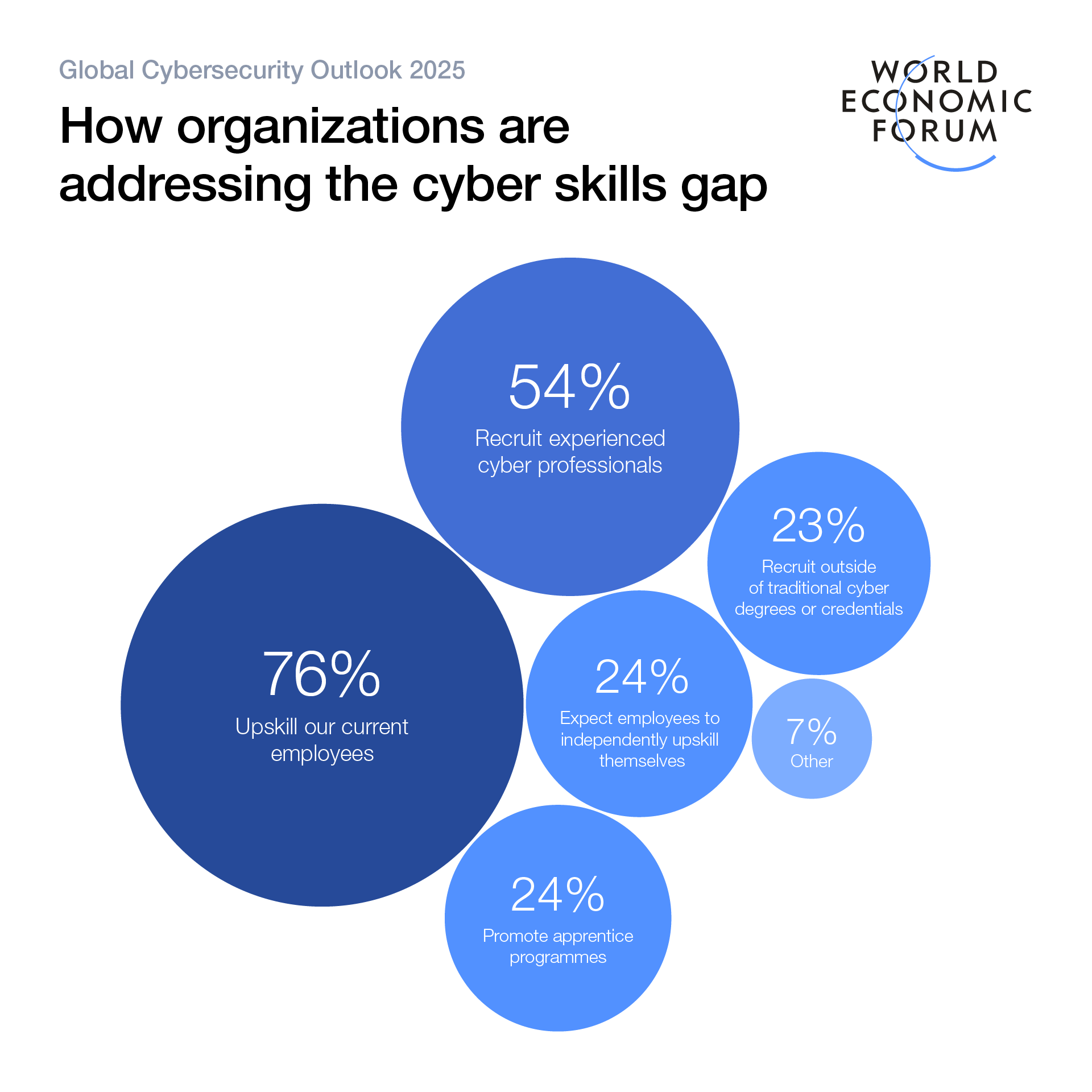Cybersecurity jobs on the rise as US industries navigate economic uncertainty

The cybersecurity talent and skills gap has been a persistent issue across industries.
Image: Unsplash
Stay up to date:
Industry: Information and Communications Technology
- The cybersecurity talent and skills gap has been a persistent issue across industries.
- New data shows that cybersecurity jobs in the United States are on the rise.
- The investments in cybersecurity talent comes as economic uncertainty remains high around the world.
Employers across the United States are strengthening their cybersecurity capacity with new hires, according to a recent report, which found that cybersecurity talent acquisition has increased following a year-long lull.
An analysis released this month by CyberSeek, a cybersecurity workforce insights company, found that public and private sector employers sought over 514,000 cybersecurity jobs in the past 12 months. The increase represents a 12% increase from the year prior.
The study “shows cybersecurity talent needs spanning the country,” CyberSeek said in press release. “Businesses of all sizes and every industry sector type, as well as state and local governments, must contend with decisions of building their cybersecurity teams through recruitment or internal development.”
The increasing investments in cybersecurity talent comes as economic uncertainty remains high in the United States and around the world. In fact, the World Economic Forum’s latest Chief Economists Outlook found that 87% surveyed economists expect businesses to delay strategic decisions, exacerbating recession risks.
“Despite broader economic uncertainty, demand for cybersecurity talent remains high, with a workforce gap continuing to challenge both the public and private sectors,” Matthew Walsh, Research Director at the labour market analytic firm Lightcast, added in CyberSeek’s statement. “These data provide valuable insights for employers, policymakers, educators, and jobseekers navigating today's evolving cybersecurity landscape.”
The cybersecurity talent and skills gap has been a persistent issue across industries.
Earlier this year, the World Economic Forum’s Global Cybersecurity Outlook 2025 found that only 14% of organizations have the necessary skilled talent to meet their cybersecurity objectives. The report also noted that two-thirds of organizations remain vulnerable to cyberattacks and breaches due to a lack of critical skills.
“The cyber skills gap continues to be a key challenge to organizations becoming more resilient,” the report stated, adding that “the acute scarcity of cybersecurity talent exacerbates the risk landscape.”
Rapidly advancing technologies have also complicated efforts to boost cybersecurity workforces. The CyberSeek report, for instance, found an increasing number of cybersecurity job postings list artificial intelligence (AI) skills as a requirement.
“Skills in operating AI and defending against it are becoming increasingly important for the next generation cybersecurity workforce,” the Global Cybersecurity Outlook 2025 notes.

Experts maintain that cooperation across industries is essential for mitigating the cyber skills gap. This includes the use of public-private partnerships (PPPs).
Last month, the World Economic Forum published a white paper, Growing Cyber Talent Through Public–Private Partnerships, which notes that the sharing of expertise and resources between public and private sector parties can strengthen the overall cybersecurity landscape. Specifically, PPPs can be used to boost skills development programmes, expand career opportunities and build sustainable cybersecurity talent pipelines, the paper notes.
“In the context of cybersecurity talent development, PPPs are often driven by a common goal of collaborative endeavour to achieve greater security rather than by direct financial profit,” the paper noted, adding that “[PPPs] bring together the strengths of both sectors to tackle challenges neither can solve alone.”
PPPs might include a cooperation agreement between a law enforcement agency and a business or academic institution. In Spain, for example, Banco Santander has partnered with Europol to facilitate cybersecurity trainings. Meanwhile in South Africa, Cisco works with the government to administer a digital accreditation programme that aims to fuel digital innovation and skills development.
“Addressing this talent gap is no longer optional: it is a necessity for securing digital assets and networks,” the white paper notes.
Accept our marketing cookies to access this content.
These cookies are currently disabled in your browser.
Don't miss any update on this topic
Create a free account and access your personalized content collection with our latest publications and analyses.
License and Republishing
World Economic Forum articles may be republished in accordance with the Creative Commons Attribution-NonCommercial-NoDerivatives 4.0 International Public License, and in accordance with our Terms of Use.
The views expressed in this article are those of the author alone and not the World Economic Forum.
Forum Stories newsletter
Bringing you weekly curated insights and analysis on the global issues that matter.
More on CybersecuritySee all
Akshay Joshi
September 5, 2025
Louai Alarabi
September 4, 2025
Sean Doyle and Natalia Umansky
August 27, 2025
Jon Jacobson
August 14, 2025
Akshay Joshi
August 7, 2025
Ricardo Villadiego
July 29, 2025





